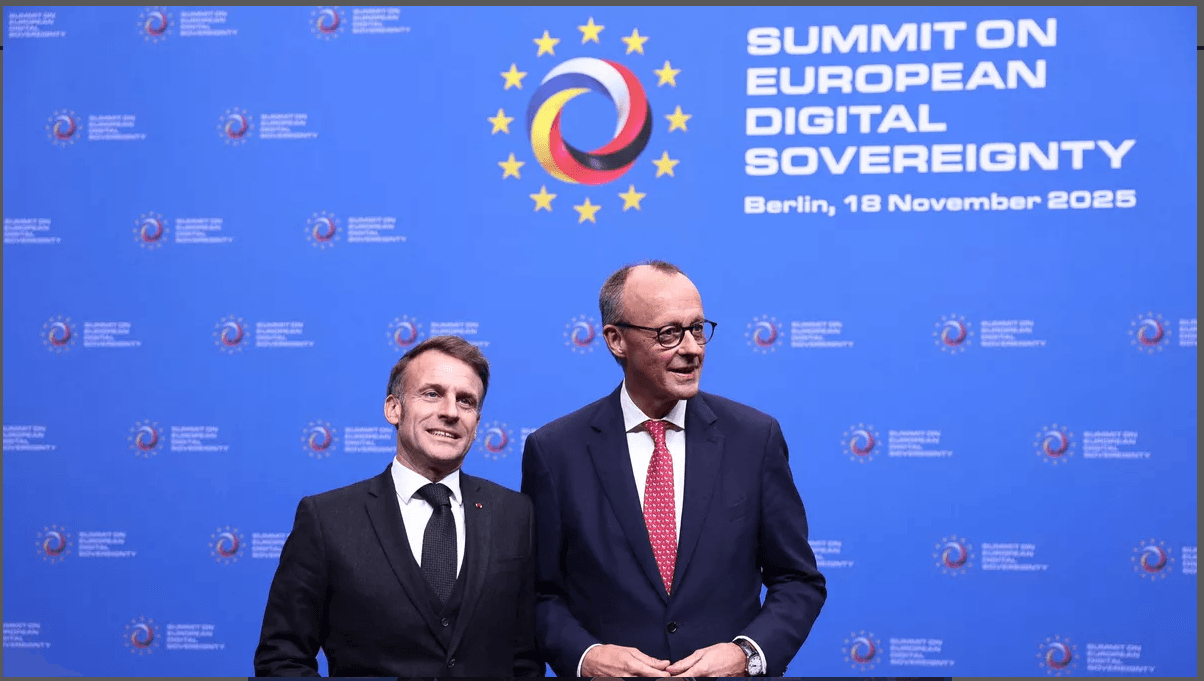Published on 11/20/2025 by Sarah ACKERMANN
Last updated : 11/20/2025
Introduction : Europe emerges from its technological dependence
The Berlin summit on digital sovereignty, chaired on 18 November 2025 by Emmanuel Macron and Chancellor Friedrich Merz, marks a turning point for Europe.
For the first time, the leaders of the two main European powers openly recognise the scale of the continent’s technological dependence and the need to regain control.
Faced with global outages from American providers, US/China rivalry and new regulatory constraints, European companies can no longer rely on infrastructures outside their jurisdiction.
In reality, this political shift confirms what UNIVIRTUAL has been advocating for years : cloud sovereignty is not an ideological debate but a requirement of security, transparency and resilience for European companies.
1. Berlin marks the end of Europe’s digital dependence
During the summit, Emmanuel Macron was explicit : “Europe must not remain a simple client of American or Chinese solutions. We must design our own infrastructures.”
The unusually direct tone marks the abandonment of a passive stance towards hyperscalers.
On the German side, Friedrich Merz added a more diplomatic nuance, but the message remains strong : “Digital sovereignty costs less than dependence.”
Two major observations were highlighted :
- the fragility demonstrated by the global outages of 2024 and 2025 ;
- the loss of strategic control induced by extra-European platforms.
The summit confirms a reality : Europe wants to regain control of its data and technologies.
2. The American cloud under scrutiny : outages, dependence and extraterritorial laws
The arguments highlighted in Berlin draw on several recent events :
- the Cloudflare outage (November 2025) ;
- the AWS interruption (October 2025) ;
- the Microsoft outage that paralysed many sectors (July 2024).
Combined with the legal pressure of the American Cloud Act, these incidents create an incompatible situation with the resilience obligations imposed on European companies by :
- NIS2
- DORA
- HDS
- ISO 27001 / 27017
- GDPR
Macron reminded in Berlin : “This fascination for non-European cloud solutions must stop.”
For the leaders, sovereignty is not a break, but a protection.
3. A new ambition : design, operate and master European infrastructures
The Berlin summit highlighted three areas of transformation :
A. An assumed European preference
A term long considered taboo is now openly claimed : European preference for strategic digital services.
B. An acceleration of European investments
More than €12 billion were announced during the summit, alongside major partnerships (SAP × Mistral, European cloud providers, binational initiatives…).
C. Simplified regulations
The European Commission will publish a text aiming to :
- reduce administrative obstacles ;
- facilitate deployments ;
- impose reinforced rules on American giants operating in Europe.
This framework offers a major opportunity for independent European cloud providers.
4. Why this turning point directly concerns businesses
Organisations must now adapt their cloud infrastructures to meet four essential obligations :
1. Localise their data in Europe
To guarantee GDPR compliance, traceability and legal control.
2. Reduce their exposure to global outages
Recent incidents have highlighted the fragility of non-European providers.
3. Anticipate audits required by NIS2 and DORA
These texts require levels of transparency and control that cloud providers subject to the Cloud Act struggle to offer.
4. Ensure lasting technological autonomy
Companies must choose, control and audit all their digital infrastructure.
Thus, sovereign cloud is no longer a niche : it becomes the norm guiding national, European and industrial strategies.
5. The sovereign cloud : technology, security and compliance combined
A European sovereign cloud provides :
Enhanced security
Tier IV infrastructures, ISO 27001, HDS, network segmentation, local monitoring, behavioural detection.
Total transparency
Full audit, traceability, access management under European control.
Strategic independence
No submission to the Cloud Act or Patriot Act.
Service continuity
Multi-site architecture, high availability, multi-zone backups.
This meets the expectations expressed during the summit.
6. UNIVIRTUAL’s sovereign approach : a pioneering vision
Long before digital sovereignty became a political watchword, UNIVIRTUAL was already defending a model based on a 100% European, secure and independent cloud.
For more than 27 years, UNIVIRTUAL has operated cloud infrastructures located exclusively :
- in France,
- in Switzerland,
- in Tier IV, ISO 27001 and HDS-certified datacenters.
Its solutions include :
- Black Sentinel, a multi-layer cybersecurity service with 24/7 monitoring ;
- Falcon Recovery, automated and encrypted multi-zone backup ;
- exclusively European governance ;
- expert support in auditing, compliance and security.
Also available :
Conclusion : Europe finally aligns with a strategic necessity
The Berlin summit of 18 November 2025 symbolises what sovereign cloud pioneers have been saying for years : technological dependence is not sustainable for European companies.
Europe is awakening, clarifying its ambition and choosing a new direction :
- autonomy,
- security,
- resilience,
- European governance.
UNIVIRTUAL has embodied this vision for years. Companies that choose a European sovereign cloud today will be those that guarantee tomorrow the continuity, compliance and independence of their critical systems.
Picture credit: Nadja Wohlleben / REUTERS



